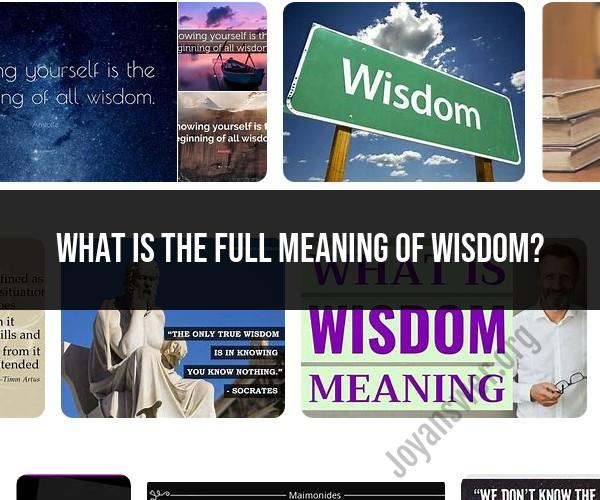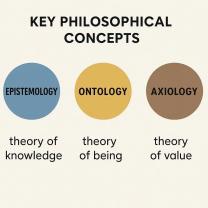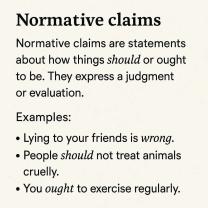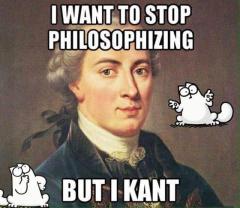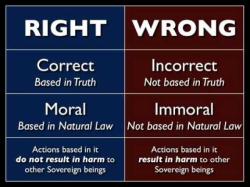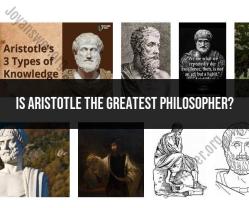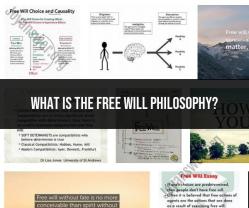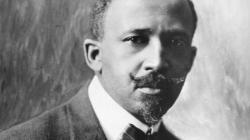What is the full meaning of wisdom?
Wisdom is a complex and multifaceted concept that is often defined and understood in various ways. Its full meaning can differ depending on cultural, philosophical, and individual perspectives. Here are some insights and interpretations of the full meaning of wisdom:
Knowledge and Experience: Wisdom often involves a deep understanding of life and the world, gained through knowledge and experiences. It goes beyond simply knowing facts; it's about the practical application of knowledge to make sound decisions.
Sound Judgment: Wisdom is the ability to make informed, rational, and morally sound decisions. It entails the capacity to assess situations, consider consequences, and choose actions that align with one's values and principles.
Emotional Intelligence: Wisdom often includes emotional intelligence, which is the ability to recognize, understand, and manage one's own emotions and the emotions of others. It involves empathy, self-awareness, and interpersonal skills.
Practicality: Wisdom is practical and pragmatic. It's about using knowledge and judgment to navigate real-life situations effectively and achieve positive outcomes.
Ethical and Moral Awareness: Wisdom involves an ethical and moral component. Wise individuals tend to make choices that are not only practical but also morally upright and aligned with a sense of justice and fairness.
Open-Mindedness: Wisdom can be associated with an open and receptive mind. Wise people are often willing to consider diverse viewpoints and are open to learning from others.
Long-Term Perspective: Wisdom takes the long view. It's not focused solely on short-term gains but considers the broader, future implications of decisions and actions.
Balance: Wisdom often involves finding balance in life, such as between work and leisure, ambition and contentment, and self-care and altruism. It's about harmonizing conflicting aspects of life.
Adaptability: Wisdom can involve the ability to adapt to change and respond effectively to new and unpredictable circumstances.
Continual Learning: Wise individuals tend to have a thirst for knowledge and self-improvement. They are open to ongoing learning and personal growth.
Cultural and Contextual Variation: The full meaning of wisdom can vary across cultures and contexts. Different cultures and philosophical traditions have unique interpretations and expressions of wisdom.
Humility: Wise people often possess a sense of humility. They acknowledge the limitations of their knowledge and are open to learning from their own mistakes and the wisdom of others.
In summary, wisdom encompasses a blend of knowledge, experience, sound judgment, emotional intelligence, ethics, and open-mindedness. It involves making practical, morally sound decisions while considering long-term consequences and maintaining a balance in life. The full meaning of wisdom is a rich and multifaceted concept that is open to interpretation and adaptation based on individual beliefs, experiences, and cultural backgrounds.
Exploring the Concept of Wisdom: Definition and Attributes
Wisdom is a complex concept that has been studied and debated by philosophers and scientists for centuries. There is no single definition of wisdom that is universally accepted, but it is generally understood to be the ability to apply knowledge and experience to make sound judgments and decisions.
Some of the key attributes of wisdom include:
- Knowledge: Wisdom requires a broad and deep understanding of the world, including knowledge of human nature, history, and culture.
- Experience: Wisdom is also gained through experience, which teaches us how to deal with different situations and challenges.
- Judgment: Wisdom allows us to weigh the pros and cons of different options and to make decisions that are in our best interests.
- Compassion: Wisdom is often associated with compassion, which is the ability to understand and share the feelings of others.
Wisdom Across Cultures and Philosophical Traditions
The concept of wisdom is found in all cultures and philosophical traditions. However, there are some differences in how wisdom is defined and understood.
In Western philosophy, wisdom is often associated with rationality and the ability to think critically. In Eastern philosophy, wisdom is often associated with intuition and the ability to see the big picture.
Despite these differences, there are some common themes that emerge when we look at the concept of wisdom across cultures and philosophical traditions. These themes include:
- Humility: Wisdom is often associated with humility, which is the recognition that we do not know everything and that we are always learning.
- Open-mindedness: Wisdom also requires open-mindedness, which is the willingness to consider different perspectives and to change our minds when presented with new information.
- Balance: Wisdom is often associated with balance, which is the ability to see both sides of an issue and to find a middle ground.
Wisdom in Practical Life: Decision-Making and Problem-Solving
Wisdom can be applied to all aspects of our lives, from making personal decisions to solving complex problems at work. When we are wise, we are able to:
- Consider all of our options carefully. We do not make decisions impulsively or without thinking through the consequences.
- Weigh the pros and cons of different options. We do not simply choose the option that seems easiest or most appealing at the moment.
- Seek advice from others. We are open to hearing other people's perspectives and to learning from their experiences.
- Make decisions that are in our best interests and the best interests of others. We do not make decisions that are selfish or harmful to others.
Gaining Wisdom Through Experience and Self-Reflection
Wisdom is gained through experience and self-reflection. As we experience new things and learn from our mistakes, we become wiser. Self-reflection allows us to contemplate our experiences and to learn from them.
Here are some tips for gaining wisdom through experience and self-reflection:
- Be mindful of your experiences. Pay attention to your thoughts, feelings, and actions in each situation.
- Reflect on your experiences. Take some time after each experience to think about what happened, what you learned, and how you can apply that knowledge to future situations.
- Be open to learning from your mistakes. Everyone makes mistakes, but the wise person learns from their mistakes and avoids making the same mistakes again.
The Role of Wisdom in Personal Growth and Relationships
Wisdom can play a significant role in our personal growth and relationships. When we are wise, we are able to:
- Make better decisions. We are able to weigh the pros and cons of different options and to make decisions that are in our best interests.
- Build stronger relationships. We are able to understand and empathize with others, and we are able to communicate effectively.
- Live more fulfilling lives. We are able to find meaning and purpose in our lives, and we are able to overcome challenges and setbacks.
Wisdom is a lifelong journey. It is something that we develop over time as we learn from our experiences and reflect on our lives. However, even a small amount of wisdom can make a big difference in our lives.
